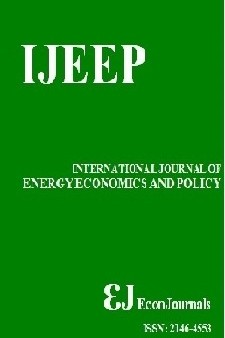The Dynamic Linkage between Technological Innovation and carbon dioxide emissions in Malaysia: An Autoregressive Distributed Lagged Bound Approach
The Dynamic Linkage between Technological Innovation and carbon dioxide emissions in Malaysia: An Autoregressive Distributed Lagged Bound Approach
Carbon Dioxide Emissions, Environmental Kuznets Curve Technological Innovation, Autoregressive Distributed Lagged, Malaysia,
- Başlangıç: 2011
- Yayıncı: İlhan ÖZTÜRK
Ernesto SOMMA, Alessandro RUBİNO
A Causal Relationship between Energy Consumption, Energy Prices and Economic Growth in Africa
Farzana SHARMİN, Mohammed Robayet KHAN
The Effects of Electricity Consumption on Agriculture, Service and Manufacturing Sectors in Malaysia
Tan Lee Pei, Mohd Shahidan Shaari, Tunku Salha Tunku Ahmad
Oil Price and Exchange Rates: A Wavelet Analysis for Organisation of Oil Exporting Countries Members
Basheer H. M. Altarturi, Ahmad Alrazni Alshammri, Tuan Muhd Taufik Tuan HUSSİN, Buerhan SAİTİ
Trade-off Curves and Elasticity Analysis in Multi Fuel Options System and Combined Problem
Ali NAZEMİ, Seyed Farid GHADERİ, Shadi Khalil MOGHADAM, Anahita FARSAEİ
Muji SETİYO, Sudjito SOEPARMAN, Nurkholis HAMİDİ, Slamet WAHYUDİ
China in Innovative Development of Alternative Energy Advanced Industrial Technologies
Mihail Nikolaevich DUDİN, еvgenia еvgenevna FROLOVA, Petr Aleksandrovich KUCHERENKO, Vitaly Aleksandrovic VERNİKOV, Natalia Andreevna VOYKOVA
Sustainable Economic Growth: An Empirical Study for the Asia-Pacific Economic Cooperation Forum
Assessment of the Required Changes of Russian Ecological Taxes
Tatiana Olegovna TAGAEVA, Alexander Olegovich BARANOV, Vadim Manavirovich GİLMUNDİNOV
